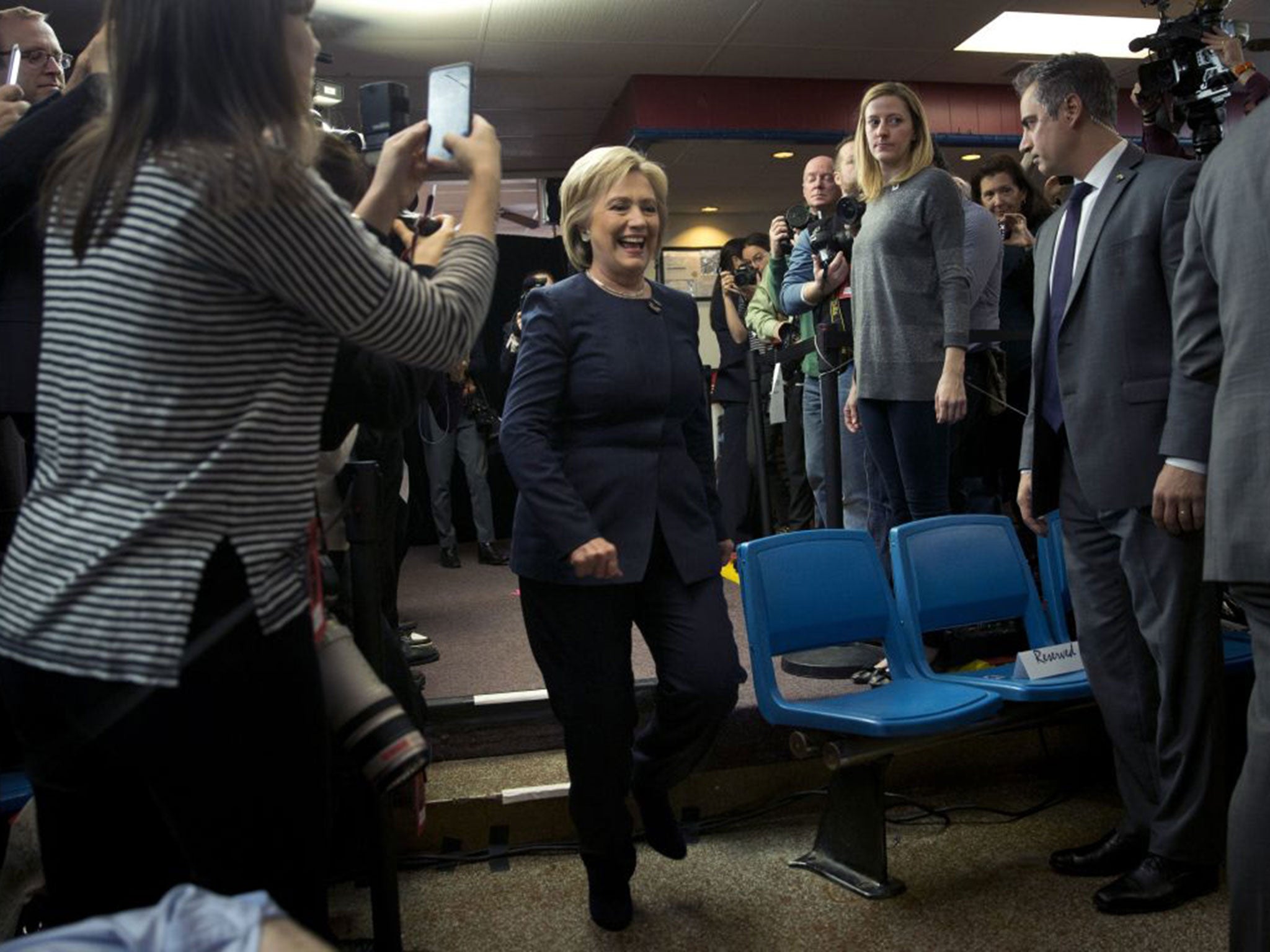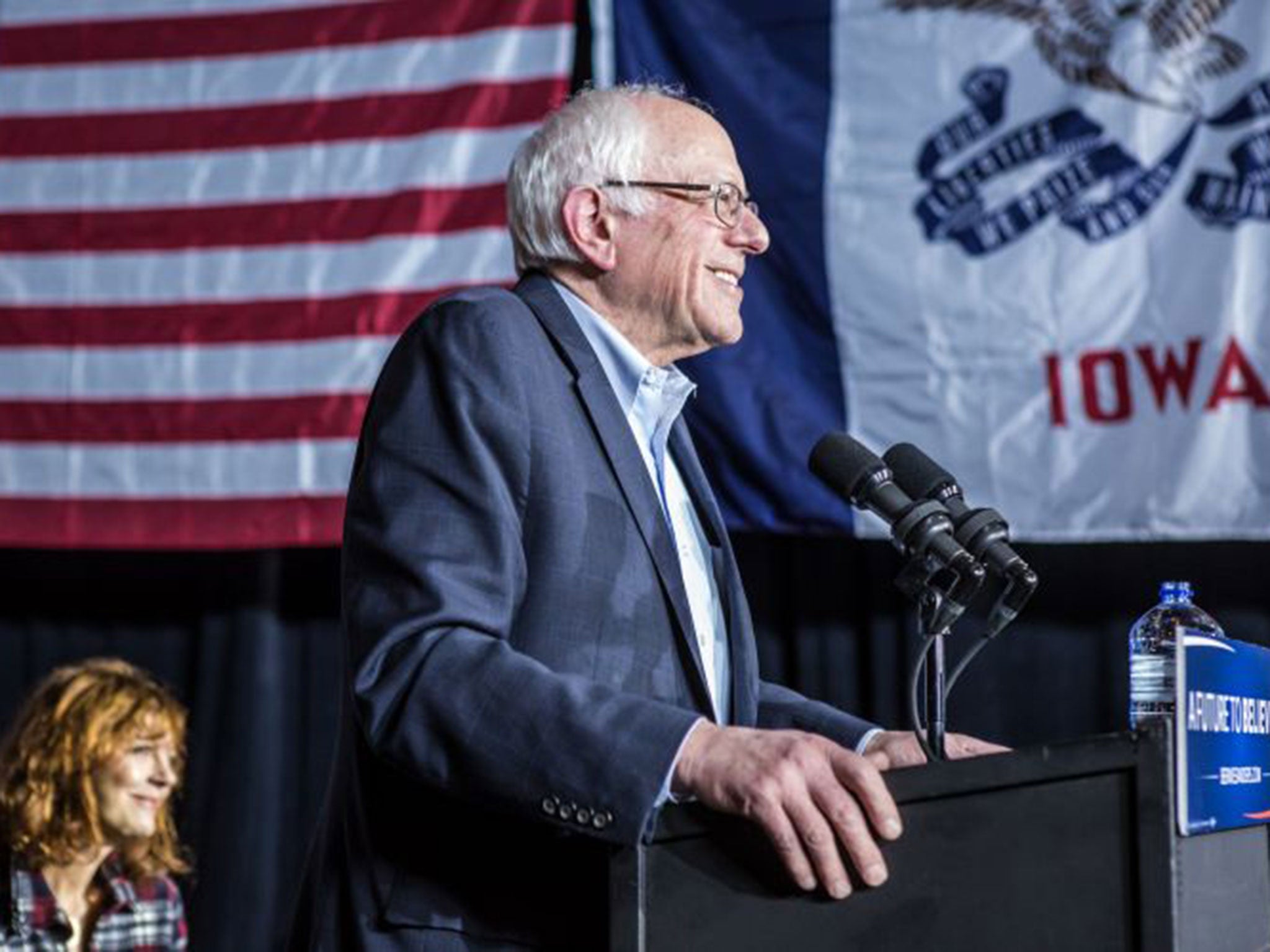US Democratic nomination: Lack of a real ‘wow factor’ keeps Hillary Clinton campaign from taking flight
The favourite for her party’s nomination is trying to inject positivity into her campaign, but voters aren’t buying it

Travel with Hillary Clinton on the campaign trail and you’ll hear her say “wow” a lot. “Wow what a great crowd,” or, as in this response to a supporter asking this week if as president she’d appoint Barack Obama to the Supreme Court: “Wow, what a great idea. No one has ever suggested that to me, I love that – wow!”
That a Hillary “wow” somehow doesn’t quite convince may be one, highly random, indicator of why, just four days out from the Iowa caucuses, where voters in the state become the first in the nation to voice their preferences for presidential nominees from both parties, her candidacy is struggling to maintain altitude. She says it with the requisite emphasis and energy, so why do we not quite buy it?
There is plenty about the former First Lady, US Senator and Secretary of State that Democrats tend not to question, from her pragmatism to her ability to defend and expand on Mr Obama’s progressive social agenda. Yet they do worry about her sincerity and her authenticity. Voters looking for some real-deal political passion this weekend are advised to attend a Senator Bernie Sanders rally, not one of hers.
That’s what they’ve been doing already. When Ms Clinton chose the gorgeously restored Orpheum Theatre in Sioux City, Iowa, for an event last week, she barely filled the lobby. When Mr Sanders took his campaign bus there a week before, he had a capacity crowd waiting for him – in the main auditorium.
The Sanders excitement machine is just one of many baffling phenomena of this election season. He has scraggly white hair, comes off like a mad inventor and at 74 is six years Ms Clinton’s senior. Yet, if he beats her in Iowa one reason will be young voters who lap up his call for a political “revolution” in America, offering free health care for all and free college tuition.
That is a prospect that Ms Clinton profoundly fears. A loss in the Hawkeye State would be particularly painful because of what happened here eight years ago. Just as this time around, Ms Clinton started out as the prohibitive favourite for the Democrat nomination in 2008, only to have Iowa voters abruptly spurn her in favour of Mr Obama. She won the New Hampshire primary a week later, but the damage was done.
In past years, as many as half of Iowans have made up their minds about the candidates they like best in the final 72 hours before the doors to caucuses open – so predicting the outcome on Monday night is perilous. But polls have for weeks shown Mr Sanders eroding Ms Clinton’s once significant lead in the state and, in the last few days, overtaking her.
Clearly, though, Mr Sanders, who happily calls himself a democratic socialist, could take Iowa. Then comes New Hampshire on 9 February, where he is already the favourite to win. He is from next-door Vermont where as a US Senator his approval rating has consistently been sky-high. The one-tine Brooklynite has a lucky early advantage. He has shown greatest strength among white voters, who heavily dominate in both early states. The Clinton camp is banking on his balloon losing air as soon as the primary cavalcade moves to states with far greater numbers of minority voters. First up in mid-February are Nevada and South Carolina. Fourteen states help pick the nominees on so-called Super Tuesday on 1 March, and most are in the American South.

Still, the notion that Ms Clinton might be beaten in Iowa and New Hampshire is scaring the bejesus out of her fans and backers who just a few weeks ago thought they could relax as she cruised to an inevitable coronation at the Democratic Convention in July. At the very least, a double loss would create an impression that it was her balloon that was going down.
Especially anxious are the major donors who have invested heavily in her occupying the Oval Office. “I wouldn’t say it’s widespread panic, it’s jitters,” Ed Rendell, the former Pennsylvania Governor and a long-time Hillary booster, told Politico this week. “I’ve reminded Clinton backers that New Hampshire changes like the wind, I told people: ‘stay cool, don’t panic.’”
The perception exists, though, that Ms Clinton just isn’t sparking. Even when she looks as if she might be enjoying herself on the stump there is the sense that she is forcing it, as part of a whatever-it-takes mentality. In an interview also with Politico this week, Mr Obama said she had made a slow start and had seemed rusty. He then paid her a back-handed compliment, suggesting that while she is “wicked smart” on policy, that might make her “campaign more prose than poetry”.
Some compare Mr Obama of eight years ago with Mr Sanders today. Both seem to have bottled magic to attract younger voters in particular. The then nascent social media scene was key to Mr Obama’s success; likewise, Mr Sanders has largely taken command of it in Iowa. There is another parallel you’d think people would be making: Mr Obama took extra energy from a sense of history being made as he sought to become America’s first black president. Ms Clinton wants to be the first female president.
Her campaign has tried to make that an asset. Supporters waiting for her to take the stage at events in Iowa are first treated to a short video biopic which includes a clip of a much younger Ms Clinton famously scolding the audience at a 1995 UN conference in Beijing that “women’s rights are human rights”. She has also sought to emphasise her sheer grit, woman or not, in the face of relentless political attacks.
“I’ve been around a long time. People have thrown a lot of things at me. I can’t keep up with it, I have to keep going forward,” she said at a candidate’s forum in Des Moines. “They come up with these outlandish things; they make these charges and I just keep going forward because there’s nothing to it.”
Maybe it will happen, but so far the prospect of electing the country’s first female commander-in-chief has stirred little excitement. But it should give her an edge among women and she has other constituencies she hopes to rely on for broad backing, among them African-Americans, Latinos and the gay community. Importantly, she has also already received pledges of loyalty from more than half of the 719 so-called “super delegates”, mostly party officials, who will go to the party convention. Whoever secures a simple majority of all 4,047 delegates – the remainder are allocated according to the results of the primary and caucus contests – takes the nomination. Mr Sanders has eight super delegates so far.
So if the bonfire now flickering for Mr Sanders does not become an inferno and gobble Ms Clinton up, she still has the wider path to the nomination. Yet none of the concerns being aired about her now – that she is not spontaneous, human or exciting enough – are likely to have gone away when the general election comes around. And Mr Trump, if he were her Republican opponent, is nothing if not spontaneous and exciting.
Sanders vs Clinton: What’s the difference?
Bernie Sanders is to the left of Hillary Clinton, but what really divides them?
Guns From Vermont, a rural state big on hunting, Sanders is on the defensive, having supported gun control less consistently than Clinton.
Health He wants to create an entirely government-funded system with free healthcare for all. She says that means ripping up Obamacare and restarting a damaging debate that may be unwinnable.
Students He wants state colleges and universities to be free for all. She says wealthier families should still contribute.
Foreign policy He accepts she is more experienced but says her judgement has been off in the past. She voted for the war in Iraq. He didn’t. He is the dove, she is the hawk.
Wall Street She is still raising money from the financial industry. He refuses to and says he will break up the six biggest banks and remove outside money from politics.
Tax He has said he will introduce small tax increases on the middle class to pay for his programmes, including healthcare. She would only raise taxes on the very rich.
Trade He calls “unfettered free trade” a “disaster”. She has waffled on whether she would push through the newly negotiated Trans-Pacific trade deal.
Trump’s TV gamble: Boycott boosts rivals
Donald Trump is squeezing every last drop of publicity from his boycott of the long-scheduled television debate with his Republican presidential rivals in Iowa, predicting it will be a “total disaster” without him.
The populist front-runner relished the storm he had unleashed by spurning the Fox News event because he thinks one of the moderators, Megyn Kelly, had mistreated him in an earlier debate – despite the risk that wavering voters would be turned off by his move.
Party officials suggested it was a gaffe that would pave the way for his two closest rivals, Senators Ted Cruz of Texas and Marco Rubio of Florida, to shine in the debate.
“It gives people a reason to be disappointed in him and take a look at the other candidates, said Republican strategist Charlie Black.
David Usborne
Join our commenting forum
Join thought-provoking conversations, follow other Independent readers and see their replies
Comments